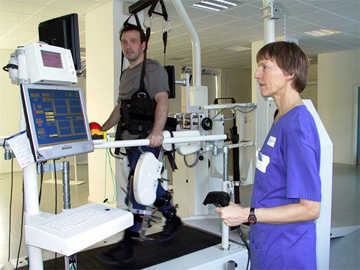Hammel Neurorehabilitation and Research Centre

Download presentation as pdf
Download as pdf-booklet
Hammel Neurorehabilitation Centre is a highly specialised rehabilitation hospital for patients with moderate to severe acquired brain injury. These injuries include traumatic brain injury, stroke, infectious/metabolic brain injury, cerebral palsy and anoxic brain injury (which occurs following cardiac arrest). The centre treats adults and children.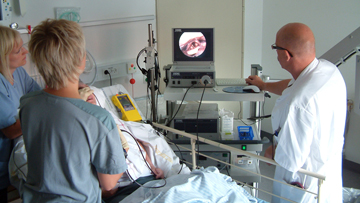
Approximately 700 patients are referred to the Hammel Neurorehabilitation Centre yearly. The centre has 84 beds and more than 500 employees.
The treatment of the patients has been organized in four highly specialised clinics, each with an affiliated out-patient clinic.
The Early Neurorehabilitation Clinic treats patients immediately following acute brain injury. The Clinic co-operates with the Neuro Intensive Step-down Ward at the Intensive Clinic at the Regional Hospital of Silkeborg. Once the patient no longer requires a ventilator they are transferred to the Early Neurorehabilitation Clinic. The Clinic treats patients with respiratory problems and initiate neurorehabilitation treatment.
The Sensory-motor Clinic treats patients with acquired brain injury and the resulting sequelae such as reduced sensation, reduced perception, linguistic problems and motor disorders.
The Cognitive Clinic treats patients with cognitive, emotional, motivational and behavioral disorders that directly or indirectly are caused by brain injury.
Neuropsychology and the neurobehavioural approach to brain injury is an essential part of patient rehabilitation.
The Pediatric Clinic (up to 18 years) predominantly treats children with traumatic brain injuries, apoplexy, cerebral palsy and sustained a brain injury due to anoxia, brain tumor, cardiac arrest, meningitis or encephalitis. The children can range from the comatose child to the mobile child with cognitive deficits.
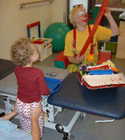
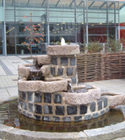
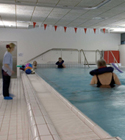
Neurorehabilitation
At the Hammel Neurorehabilitation Centre, rehabilitation is conducted through a coordinated and targeted cooperative process between the patient (with physical, psychological and social limitations), the patient’s family and the highly specialised clinical staff.
The rehabilitation utilises the ICF framework and targets impairments in bodily functions, activity limitations, participation restrictions, social and environmental factors. The purpose of this is to enable the patient to live independently, maximising life satisfaction based on his or her decisions.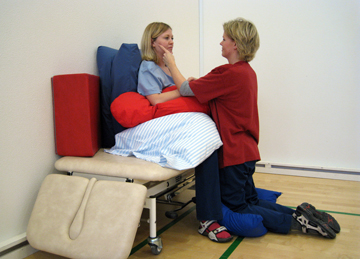
Rehabilitation is administered by teams consisting of doctors, nurses, occupational therapists and physiotherapists. In addition, speech therapists, social workers, neurophysiologists, educational consultants and dieticians may also be involved in the rehabilitation process depending on the needs of the patient.
Due to our extensive experience utilizing an interdisciplinary approach, in addition to the many employees distributed to each professional group, optimal conditions for focused and interdisciplinary development are created.
Research and training
At Hammel Neurorehabilitation Centre research activities are part of the clinical routine. The Research Unit is integrated within the centre and supervised by a professor in neurorehabilitation (as part of Aarhus University). The two main research areas are motor control and cognitive science in rehabilitation.
Hammel Neurorehabilitation Centre also has a Department of Continuing Education. The Department of Continuing Education offers courses, seminars and other forms of competence development in the field of neurorehabilitation.